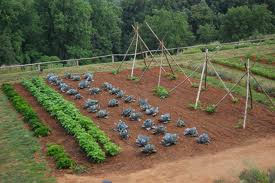The site of a vegetable garden will greatly determine its success. The amount of sunshine a garden plot gets throughout the day, the soil type and other cultural factors play a role in a garden’s productivity.
Fruiting vegetables, like tomatoes, squash and peppers, require a full day of sunlight. Root vegetables, like carrots and beets, can get by with a half a dayof sun; and leafy vegetables, like lettuce, tolerate the most shade.
To determine the amount of sun available for growing a vegetable garden, stake the edges of shadows once in the morning and once in the late afternoon. This will reveal the areas that receive full sun for six hours or longer.
Also consider the soil content of the garden site. If the soil is shallow in depth, or consists of mostly heavy clay, then root systems may not develop sufficiently to provide nutrients to plants. Avoid planting near tree roots because vegetables can’t compete for nutrients and water with the root systems of established trees and shrubs. Make sure that the soil drains well. Standing water after storms will stunt the growth of vegetables, by cutting off oxygen to the root systems. Therefore, storm runoff may need to be diverted from the garden.
While good air movement around a garden is important, avoid planting a garden in windy areas where wind can dry out soil and plants, as well as, break plants. Planting a garden near a windbreak, fence or shrubs can protect vegetable gardens. Choose a spot close to a water supply for convenience. Plant a vegetable garden where it can be visited frequently to monitor plant pests, and for ease of harvest.
Many people plant vegetables among flowers and other plants, rather than in an area devoted exclusively to vegetables, because vegetable plants can also be attractive. And, perhaps even more importantly, flower pollinating bees are critical to the pollination of your fruiting vegetables also!
For more information, see the following Colorado State University Extension fact sheet(s).



